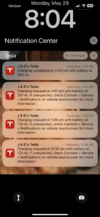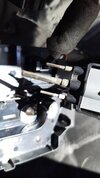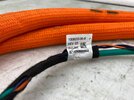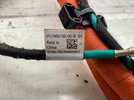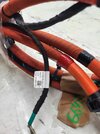Our 2015 85D (age matters in this story) had intermittent charging stoppages for a few weeks now. The instrument panel charging info said "charging equipment not recognized," I think...at our usual home connection. Much as ZoomMYLR found, the problem moved with the car though, as a visit to a supercharger had similar problems, but managed to hold its connection enough to charge. So, I pretty much knew at that point that the problem was not the chargers. It was the car.
I have disassembled the charging port and inspected the components. I believe I know what is actually failing on our, and your, Teslas. The charge port has 5 conductors. Looking at the socket from the outside you can see the two large pins that carry the charging current, and below them you can see the grounding and control circuit pins. I will bet good money that at least one of those control circuit pins is corroded, or dirty, or whatever enough to be problematical (as ours is/was). I have cleaned the pins and gotten good results. Charging has been without issue for the past few days now.
My diagnosis was inspired by the ability to make the problem cease by pulling the plug, when inserted, sort of forward and up (perpendicular to the angled edge of the taillight/door). As long as I held it in place like that it was functional. As soon as I let go it would fail. I considered it highly unlikely a genuinely failed charge port could be induced to work by doing this.
We took it to the service center. They determined that the problem is the charge port itself. They quoted $1457.77 (incl $90 sales tax) to replace the charge port assembly. They do not allow separate sales of the control circuit connector/wire assembly. Mind you, the 3-prong connector/cable is a very simple and relatively inexpensive part, maybe around $100 even at Tesla prices. It is similar to what you can find as various "plow connectors", et al, online, (so NOT spaceX tech here). It is likely the cheapest piece of what they call "the assembly". At one point during the messaging discussion they told me they would be more than happy to sell me the part I wanted over the counter. They had to backtrack after a little research. They then said that the part number I gave them, which I got from a picture of the part online showing the number quite clearly, is not valid in their system. The new situation is: you can't buy the little (read 'less expensive) failed part (#1065730-00-C). You must buy the whole thing for about $800 (based on the taxes charged in the invoice which does not itemize labor and parts costs). $560 more for labor has to make you wonder, too. My first effort took a couple hours, in and out, and even less the second time. How slow, or expensive is their staff? $280 an hour for a neo/trainee to take 2 hours? Oh, by the way, the "whole thing" is, per the service center, "not readily available as the revision that is on your vehicle is on restraint company wide. No one has it and we have it on special order from another state." I am not sure that even makes sense, but it is what they state..
I have some advice for all Tesla owners, especially the owners of older models like ours. This problem is a result of usage-over-time wear and tear...many plug-ins/outs (abrasion) and an abundance of humidity/moisture (corrosion) in the environment, in whatever ratios, take their toll. Our many plug-ins happened because it's now an aging 2015. Abundant humidity happened because it was California, and right on the coast...it rained like hell this year (car is kept outdoors, but under a fabric cover with a flap at the charge port). Therefore it is likely this is going to happen to virtually all Teslas as they age, regardless. I have ordered a set of contact cleaning tools that are made for the "plow connectors". The tools I ordered are little tubular, longitudinally cut in half (sorta like a gutter), files for cleaning the pins from outside the car without any disassembly. Some of the cleaners are like tiny battery terminal cleaners with brushes inside the tubes. Regularly use some electrical contact cleaner and corrosion prevention on your power plugs and the pins. And what the heck...I suppose you could ask your service center to evaluate the condition of your charge port during a visit for whatever other reason you go there.
